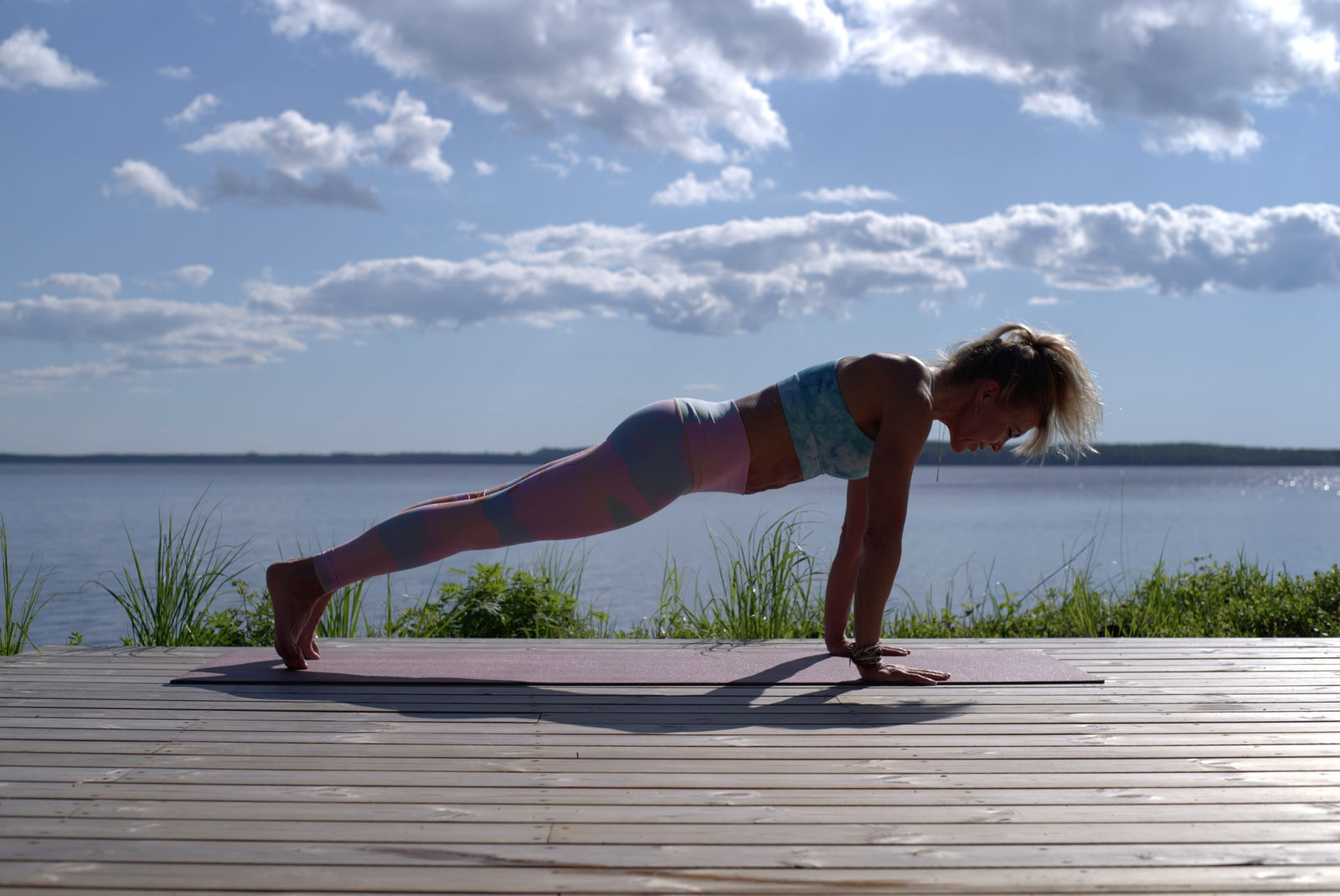Photo by Robert Collins on Unsplash
Stress can ruin your health and in the long run even kill you. But you don't have to let it rule your life. There are steps you can take to fight stress and cultivate well-being.
Stress is prevalent in society. Check out these stats from Stress.org: [1]
- 55 percent of Americans are stressed during the day.
- Americans aged 30-49 are the most stressed age group.
- Women are more stressed-out than men.
- 52 percent of Generation Z (6 to 24 years old) in the United States have been diagnosed with mental health issues.
- 83 percent of US workers suffer from work-related stress.
- Stress causes about 1 million workers to miss work daily.
What are the effects of stress?
As we pointed out in a VALI blog [2], some of the problems caused by stress include:
- Headache, chest pain, stomach upset, and muscle tension or pain
- Sleep problems, fatigue, and decreased sex drive
- Anxiety, sadness, depression, anger, and irritability
- Restlessness, lack of focus or motivation, feeling overwhelmed
- Angry outbursts, overeating, under-eating, withdrawing from society
- Drug abuse, tobacco use, exercising less
As you can see, some of these stress-related problems can lead to still other problems, including sleep disruption, overeating, abuse of drugs, alcohol and tobacco.
Overcome stress and feel well
Be good to yourself
Don't speak harshly or unkindly to yourself. Say positive things to yourself when you talk to yourself in your mind. Just as you should be kind to your spouse or partner, your children, co-workers and friends, be good to yourself.
If you make a mistake, acknowledge it and move on. Beating yourself up only adds to the stress you already face in life.
Do acts of kindness
Being good to others can help you, too. One study found that people who help others have a reduced mortality rate [3].
Talk to others about your problems
Just talking it out with other people can take a big burden off your shoulders. You don't want to come across as a complainer, but telling people what's going on in your life can help you cope.
If you don't want to talk to co-workers or friends, try therapy. A therapist will listen to you and should give you sound advice on how to cope with any problems situations you may have.
This motivational speaker says stress is natural and unavoidable, but there are ways to manage and reduce it.
Enjoy the outdoors
As Viter Energy blog reported [4], a Harvard blog says being outside has several benefits [5]:
- Your body's production of vitamin D will get a boost from the sunlight. "Studies suggest that this vitamin helps fight certain conditions, from osteoporosis and cancer to depression and heart attacks. Limited sun exposure (don't overdo it), supplemented with vitamin D pills if necessary, is a good regimen," the Harvard blog states.
- You will exercise more. The benefits of exercise are many, including improving heart and lung health, reducing excess weight, building up the muscles that will keep you strong, and boosting your immune system. Plus, sitting at a desk all day is very pathological for many reasons.
- You will become happier if you spend time outdoors. "Light tends to elevate people's mood, and there's usually more light available outside than in. Physical activity has been shown to help people relax and cheer up, so if being outside replaces inactive pursuits with active ones, it might also mean more smiles," the blog says.
- Improve your concentration. "Children with ADHD seem to focus better after being outdoors. It might be a stretch to say that applies to adults, but if you have trouble concentrating, outdoor activity may help," Harvard says.
-
Speed healing from injury or disease. "In one study, people recovering from spinal surgery experienced less pain and stress and took fewer pain medications when they were exposed to natural light. An older study showed that the view out the window (trees vs. a brick wall) helped recovery in the hospital," Harvard says.
If you go for a nature walk or spend time at the beach, you might not have a cup of coffee or tea handy. Try some Viter Energy Mints [6] instead.
The mints have 40 mg of caffeine, are sugar-free and freshen the breath, plus they contain invigorating B vitamins.
Buy Viter Energy Mints at the link above or on our Amazon.com page [7].
Alternatively, VALI has a product called Caffeine and L-Theanine [8]. The nootropic stack and L-theanine work to help you concentrate, be more creative, and stay focused without the headaches, crashes, and anxiety that can come from caffeine alone.
Exercise
Physical activity is an essential strategy for stress management. Working out and exercise produce happy hormones – or endorphins. In fact, studies show that exercise leads to a better mood because of the changes it does in your brain, both short-term and long-term. [9]
According to research, 20 or 30 minutes of aerobic exercise can help your body release endorphins, chemicals that when interacting with receptors in your brain, can reduce your perception of pain and bring a positive vibe.
Exercise can also release serotonin and dopamine, mood-enhancing chemicals that can stay within your system over the next couple of hours post-workout.
It may sound counter-productive, but a workout when feeling stressed and exhausted can help turn things around.
Observe sleep hygiene
As we pointed out in the VALI blog [10], a good night's sleep starts with sleep hygiene or practices. The first thing is to practice a good routine that works for you that helps you get to sleep. The CDC says [11] good sleep hygiene consists of:
- Going to bed around the same time every night
- Making the bedroom dark, quiet, relaxing, and at a comfortable temperature—for both you and the baby, if the baby sleeps in another room
- Removing electronic devices from the bedroom and not using them too soon before sleep
- Avoiding large meals, coffee, and alcohol before going to bed
- And getting exercise in the daytime, but not too soon before bedtime
Do something playful
Be like a kid and do something you find fun and exciting. Adults can take a lot of clues from children, who know how to play instinctively. Watch a screwball comedy, have a costume party, play charades with friends. The list is endless.
Turn off your cellphone
Turning off your cellphone can really reduce the stress you face. It can act like an umbilical cord to work, be a bearer of sad or distressing news about society, and it can keep you from other activities that are not stressful.
A scan of a Google search on "stress and cellphones" finds a plethora of headlines like these:
The Hidden Stress of Cell Phones [12]
Feeling More Stress and Anxiety? Your Smartphone May Be to Blame [13]
Try VALI Neuro Force
VALI Neuro Force [14] is a dietary supplement that promotes brain power and better mood. It also has ingredients that help you deal with stress.
Some of the ingredients in Neuro Force are:
- DMAE is a compound that some believe can enhance memory, improve mood and brain function. Advocates of DMAE say it can have benefits for patients with ADHD, Alzheimer's and other forms of dementia, and depression.
- GABA is another compound thought to have many benefits. It may help relieve anxiety, improve the mood, and treat ADHD. But don't stop there, it also reduces PMS symptoms, helps grow lean muscle, burns fat, relieves pain, and stabilizes blood pressure.
- Bacopa seems like another miracle worker. The herbal extract, also called brahmi, treats Alzheimer's, improves memory and thinking, reduces anxiety, and treats ADHD. (Talk to a doctor before you try any supplement; we do not advise substituting Bacopa with ADHD medication.)
- The type of carnitine in VALI is perhaps the most effective form to help your brain. Studies in animals show it may help prevent mental decline from aging and improve learning. It may also, human studies show, reverse loss of brain function from Alzheimer's. It may also improve brain function in alcoholics.
- Tyrosine may increases levels of dopamine, adrenaline, and norepinephrine, neurotransmitters that improve memory and perhaps performance under stress.
Conclusion
Don't let stress ruin your sex life, destroy your happiness and well-being, and have a deleterious effect on your health. Turn off that cellphone, get outside, be kind to yourself and others, and get a good night's sleep.
Sources:
[1] https://www.stress.org/42-worrying-workplace-stress-statistics
[2] https://www.valiup.com/blogs/vali-blog/what-is-ashwagandha-the-indian-ginseng-helpful-for
[3] https://www.ncbi.nlm.nih.gov/pmc/articles/PMC3780662/
[4] https://www.goviter.com/blogs/viter-energy-blog/step-outside-and-feel-less-stressed-and-more-alive
[5] https://www.health.harvard.edu/press_releases/spending-time-outdoors-is-good-for-you
[6] https://www.goviter.com/collections/viter-energy-mints
[8] https://www.valiup.com/products/vali-caffeine-l-theanine-nootropic-stack
[9] https://www.ncbi.nlm.nih.gov/pmc/articles/PMC5934999/
[10] https://www.valiup.com/blogs/vali-blog/some-facts-about-the-sleep-aid-melatonin
[11] https://www.cdc.gov/sleep/about_sleep/sleep_hygiene.html
[12] https://www.uchealth.org/today/the-hidden-stress-of-cell-phones/








